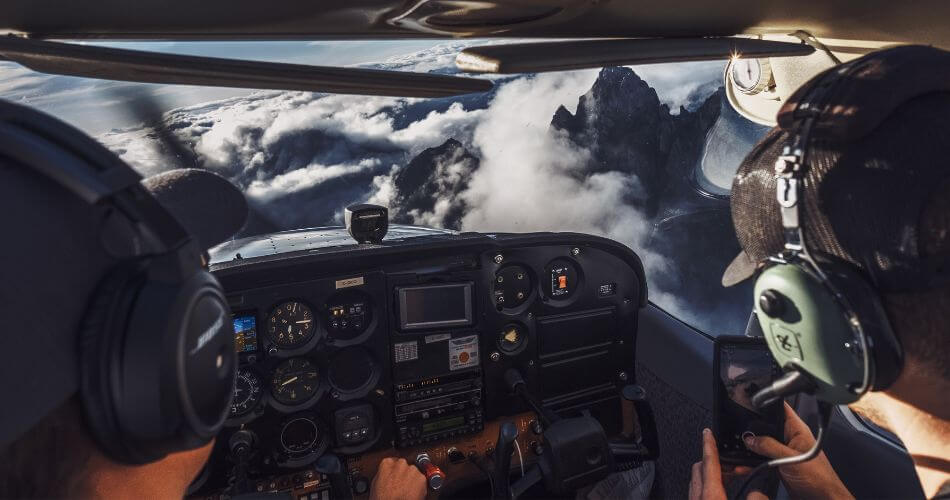Flying and Walking by Faith: Navigating Life’s Storms with Trust
When the path is unclear, trust the instruments that guide you—faith, wisdom, and divine direction.

Flying and Walking by Faith: Learning to Trust the Path Ahead
Life, much like flying, often presents us with moments when we cannot rely on what we see or feel.
Pilots face this challenge during what’s known as a “graveyard spin,” where their senses mislead them into believing their aircraft’s orientation is different from reality.
In such times, the only thing that saves them is their unwavering trust in the instruments that guide their flight.
In the same way, we are called to fly by faith, not by sight. This principle applies to navigating life’s storms—whether in our careers, personal lives, or spiritual journeys.
Flying and walking by faith means trusting that, even when we can’t see the outcome, the instruments we’ve been given—our faith and values—will lead us safely through.
The Graveyard Spin: A Lesson in Trust

The graveyard spin is a critical concept in aviation that exemplifies the dangers of relying solely on sensory perception. Imagine a pilot flying in low-visibility conditions.
As they make a slow bank to the left, their body adjusts to the sensation of the turn, leading them to believe that they are flying straight.
When they attempt to correct the spin by turning right, their body misinterprets the motion, and they think they are spinning the other way.
This disorientation can be fatal if the pilot does not trust their instruments to guide them back to safety.
Spatial Disorientation
In life, just as in flying, our perceptions can deceive us. The “graveyard spin” serves as a powerful metaphor for those moments when we feel lost, confused, or overwhelmed.
Entrepreneurs, estate agents, and professionals often experience their own version of this disorientation when faced with setbacks, financial challenges, or uncertain futures.
In those moments, relying on faith and the guidance of a higher power becomes crucial to stay on course.
Trusting the Instruments: A Matter of Faith
Just as pilots must undergo rigorous training to trust their instruments, we too must develop and strengthen our faith.
In aviation, instrument training equips pilots with the skills to fly using only the data provided by their instruments, rather than relying on external visual cues or their own senses.
This training is vital for flying in adverse conditions, such as during night flights or through dense clouds, where visibility is limited.
In the same way, life’s challenges often demand that we trust our spiritual “instruments”—our values, principles, and faith.
Proverbs 3:5-6 urges us to “trust in the Lord with all your heart, and lean not on your own understanding; in all your ways acknowledge Him, and He will make your paths straight.”
This verse is a reminder that when life clouds our vision, we can rely on God’s guidance to lead us through uncertainty.
Spiritual Parallels
Just as pilots rely on instruments to navigate safely, we must rely on our spiritual instruments—prayer, wisdom from Scripture, and faith in God’s plan.
Our senses and emotions can mislead us, especially when we are tired, anxious, or overwhelmed. Trusting in God allows us to see beyond the current moment and navigate our challenges with clarity and purpose.
Navigating Life's Challenges with Faith

As entrepreneurs, estate agents, or newcomers to any industry, the pressures of uncertainty can feel like flying through turbulent skies.
The market fluctuates, deals fall through, and success may feel elusive. Like a pilot flying into a storm, you may find yourself questioning whether you can weather the conditions ahead.
In these moments, it’s crucial to trust the spiritual principles and tools that will guide you through.
Developing Your Instruments
Just as pilots train rigorously to master their instruments, you too must invest in your faith and spiritual discipline.
This includes regularly turning to Scripture for wisdom, engaging in prayer to seek clarity, and continuously reflecting on your values.
These are your guiding tools that will help you make decisions, even when you can’t see the full picture.
The Lighthouse Analogy
Imagine being a ship’s captain navigating through a thick fog. The waves are crashing, and visibility is nearly zero. At this moment, the captain’s only hope lies in the lighthouse—a beacon of light guiding the ship to safety.
If the captain ignores the lighthouse, relying on his own instincts, disaster may strike. Similarly, when we face challenges, trusting our spiritual guidance is essential.
Faith, like the lighthouse, provides direction when we are lost.
Continuous Training: Strengthening Faith in Uncertain Times

In aviation, instrument training is not a one-time lesson. Pilots must continuously practice and refresh their skills to stay sharp.
Similarly, maintaining your faith requires ongoing dedication. Proverbs 3:5-6 provides the key to living by faith, especially during difficult times.
Trust in the Lord’s wisdom and lean not on your own understanding.
Daily Training
Pilots are required to complete hours of cross-country flights and simulated flight experiences under instrument-only conditions.
Likewise, life will inevitably put your faith to the test. You may face personal setbacks, professional challenges, or even moments of deep doubt.
These moments are not setbacks, but opportunities to deepen your trust in God and build resilience.
Reflecting on Psalm 119, we are reminded that affliction and challenges are often part of our growth. The Psalmist writes, “It is good for me that I have been afflicted, that I may learn Your statutes” (Psalm 119:71).
Like pilots who undergo training to fly safely through storms, we too must see life’s difficulties as necessary for our spiritual growth.
Walking by Faith, Not by Sight
When life’s challenges overwhelm us, it’s tempting to rely on what we can see and feel.
But faith, as described in Hebrews 11:1, is “the assurance of things hoped for, the conviction of things not seen.” True faith requires us to trust even when the outcome is uncertain.
Consider the words of Jesus in Matthew 6:25-34, where He instructs us not to worry about tomorrow. Just as a pilot cannot foresee every storm or obstacle, we cannot predict every difficulty we will face.
But we can trust that God, like the instruments guiding a plane through a storm, will lead us through to safety.
Living by Faith: Trusting God in All Things

As we close, let’s take a moment to reflect on what Proverbs 3:5-6 teaches us about living by faith and trusting in God.
This seemingly simple command—trust in the Lord with all your heart—can sometimes feel incredibly difficult. But it’s the essence of walking and flying by faith.
Trust: Our human instinct often says, “I’ll believe it when I see it,” but God calls us to a higher standard: “Believe first.” While we may eventually see the fruits of our faith, true trust is about believing God’s promises without requiring visible proof. Even if we never see the results, our confidence rests in Him.
Trust without wavering: Partial faith can leave us unstable, as James 1:8 warns. Trusting God with all your heart requires practice, and life will test that faith. But each test strengthens our ability to trust fully, without doubt.
Trust God, not yourself: Proverbs reminds us not to lean on our own understanding. While God has given us the ability to reason, He wants us to rely on His wisdom, which surpasses our limited perspectives. This is the essence of walking by faith—trusting that God sees what we cannot.
Trust daily: Trust isn’t just for desperate moments or special occasions. It’s a daily decision to acknowledge God in every part of your life, big and small. Invite Him into your everyday moments and trust Him to guide you through them.
Trust the path: When we step out in faith, God directs our paths. The word paths (plural) is key. God knows every road we will travel, and He promises to guide us through all of them. But to experience His guidance, we have to keep moving, even when the way ahead seems unclear.
When the light fades and the storms of life grow heavy, remember: Fly by faith, not by sight. Allow God and His Word to be the divine guidance system that directs your every step.
Trust that His plan is perfect, and no matter how uncertain the journey may feel, you are always safe in His hands.
Acknowledgment:
This article, “Flying by Faith,” draws inspiration from the profound teachings of my favorite pastor, Dr. David Jeremiah. His wisdom and unwavering faith continue to inspire me and countless others to trust in God fully, even in life’s most challenging moments.
